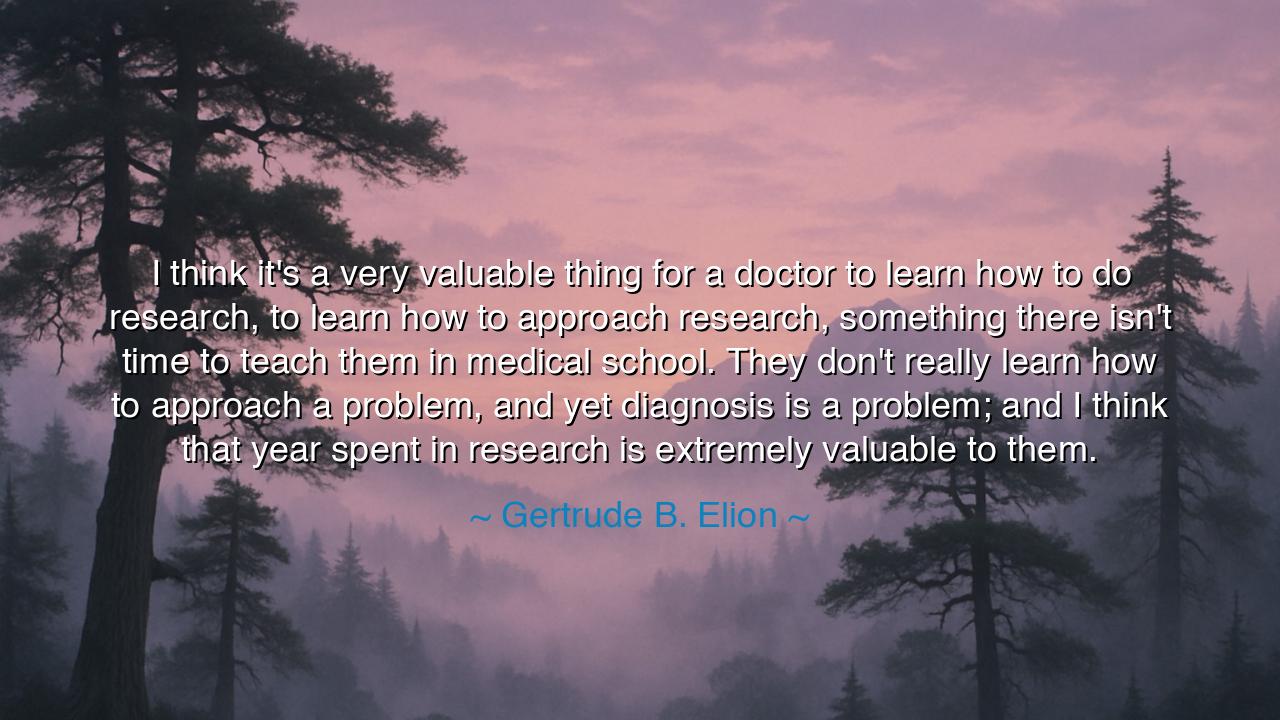
I think it's a very valuable thing for a doctor to learn how to
I think it's a very valuable thing for a doctor to learn how to do research, to learn how to approach research, something there isn't time to teach them in medical school. They don't really learn how to approach a problem, and yet diagnosis is a problem; and I think that year spent in research is extremely valuable to them.






In the great halls of knowledge, the path to wisdom is not merely paved with books, but with the fire of inquiry and the patient pursuit of truth. In the words of Gertrude B. Elion, "I think it's a very valuable thing for a doctor to learn how to do research, to learn how to approach research, something there isn't time to teach them in medical school. They don't really learn how to approach a problem, and yet diagnosis is a problem; and I think that year spent in research is extremely valuable to them." These words resonate like the voice of an elder passing down a profound truth: that the art of medicine is not simply about knowing the body, but about learning how to seek knowledge and understand the mysteries that lie beneath the surface.
In an age where doctors are expected to possess vast knowledge of the body’s systems, it is easy to forget the essential skill that must accompany this knowledge: the ability to solve problems. Elion’s wisdom teaches us that medicine, at its core, is not just about applying learned techniques, but about cultivating a deep, methodical approach to problems—about research. The process of diagnosis is itself a riddle, a puzzle that must be unraveled with both dedication and precision. It is in this space between the symptoms and the diagnosis that the true art of healing resides, and it is here where the power of research transforms theory into practice.
Consider the example of the great physician and researcher Sir William Osler, one of the founders of modern medicine. Osler’s genius was not solely in his ability to diagnose and treat patients, but in his approach to problem-solving. He was one of the first to introduce the idea of medical residency, where young doctors spent their days not only learning from their mentors but also engaging in research. This practice, now fundamental to the medical field, aligns with Elion’s belief that research is an essential skill for all doctors. Osler understood that in order to truly understand the complexities of the human body, one must be willing to question, explore, and experiment—qualities that are best nurtured through the disciplined study of research.
Elion’s statement reveals the truth that medical schools often fall short of teaching their students the essential problem-solving skills required in medicine. Medical training is intense and comprehensive, yet it often focuses more on memorizing facts than on critical thinking and creative inquiry. The importance of research in medicine lies not only in finding new treatments or cures but also in the methodology it teaches—an approach that encourages doctors to ask the right questions, to look beyond the obvious, and to understand that the answers they seek may be buried in layers of complexity. By spending time in research, doctors are taught how to frame problems, test hypotheses, and ultimately discover truths that can transform lives.
The great physician Hippocrates, the father of medicine, may not have had modern research tools at his disposal, but his approach to diagnosis and treatment was founded on observation and inquiry. His famous oath, often considered the foundation of medical ethics, emphasized the importance of understanding the nature of disease rather than simply treating its symptoms. In this, Hippocrates was an early proponent of the scientific method, which is the very heart of research. He understood that medicine is not simply the application of what is known but a constant, ever-evolving process of learning, discovering, and adapting to new findings.
Elion’s insight into the importance of research echoes through the centuries, urging all who walk the path of medicine to remember that the quest for knowledge is not a destination but a journey. This journey requires doctors to remain humble in the face of uncertainty, to embrace the unknown, and to continually seek answers that will improve the lives of their patients. Just as Elion’s own work in developing life-saving drugs was the result of a relentless pursuit of understanding, so too must the modern physician dedicate themselves to the craft of research, honing their skills of inquiry and learning from the vast expanse of knowledge that lies beyond the classroom.
And so, dear listener, the lesson to be learned here is simple yet profound: do not rely solely on what you are taught, but seek out the questions that lie beneath the surface. Like the ancient philosophers who sought knowledge through both reason and experience, let the pursuit of research shape your path. Doctors, in particular, must remember that their art is not only about understanding the body but also about learning how to approach each new challenge with curiosity, diligence, and an unyielding commitment to finding the truth. Through this process, the art of healing will continue to evolve, and the practice of medicine will always be driven forward by the boundless power of discovery.






AAdministratorAdministrator
Welcome, honored guests. Please leave a comment, we will respond soon